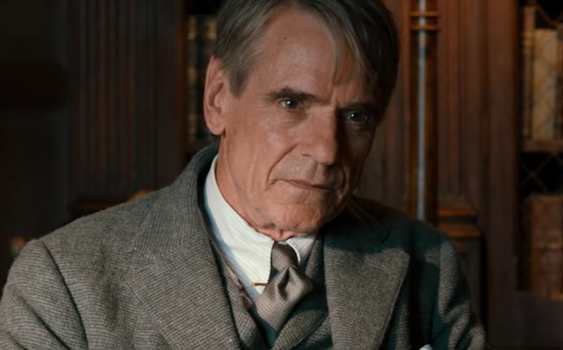Jeremy Irons Goes From 'Batman' to Math Mentor in 'The Man Who Knew Infinity'

Jeremy Irons as Prof. G.H. Hardy in ‘The Man Who Knew Infinity’
Jeremy Irons has played a mentor to two very different pupils in two very different movies this year. Back in March, the veteran British actor became the latest big-screen Alfred to provide invaluable friendship and assistance to Gotham’s Dark Knight in Batman v. Superman: Dawn of Justice. And as Trinity College professor G.H. Hardy in the new film The Man Who Knew Infinity, which debuted in limited release on April 29, he offers the same guiding hand to another unique hero, forward-thinking mathematician Srinivasa Ramanujan, played by Slumdog Millionaire’s Dev Patel.
Related: Jeremy Irons Talks ‘Batman’
Unlike Batman and Alfred, though, Ramanujan and Hardy were a real-life Dynamic Duo. In 1914, the preternaturally gifted young mathematician sailed from his home in India to flex his mathematical muscle in England under Hardy’s tutelage. Although he died a mere six years later at the young age of 32, Ramanujan left behind an impressive body of work, much of which exists in four notebooks that are practically sacred within mathematical circles. Meanwhile, Hardy went on to make his own significant contributions to the field, some of which was built on his relationship with his student and colleague. “These were people who shared a passion for mathematics,” Irons tells Yahoo Movies. “But you can’t make a movie about mathematics—that doesn’t hook an audience. You have to make a movie about relationships.”
In the film, as in real life, the characters’ clash of cultures and belief systems—Ramanujan is a devout follower of the Hindu faith, and Hardy a staunch atheist—makes that relationship rocky at times. Fortunately, their mathematical bond kept them together even as the prejudices of the times regularly thwarted the Indian immigrant’s attempts to be accepted by the university establishment. Irons says that he didn’t meet his co-star until the first read-through of the script, which allowed their off-screen relationship to mirror the one they act out on screen. “My character doesn’t know his before the movie starts, so I was able to get to know Dev through the movie, as Hardy does with Ramanujan, Irons says. “It was easy, because he’s a very good, very natural actor.”
Related: Zack Snyder on Casting Jeremy Irons as Alfred in ‘Batman v Superman’
By his own admission, Irons doesn’t possess a mathematical mind, so he found his way into Hardy by zeroing in on the man’s passion in his profession. “It’s really not all that different from the passion others have for art or for painting; it’s a voyage of discovery,” Irons explains. “That whole attitude towards mathematics was something completely new to me. Once I found where Hardy got his buzz, I could begin to play him.” So far, at least, Irons says the movie’s portrayal of the Hardy-Ramanujan relationship has added up for actual mathematicians. “We’ve had many of them see the movie and they were very impressed by its accuracy to their profession, and their art.”
Besides mentoring Batman and Ramanujan, 2016 also represents a big year for Irons as three of his best-known movies are celebrating anniversaries: Karel Reisz’s The French Lieutenant’s Woman turns 35, Roland Joffe’s The Mission turns 30, and Steven Soderbergh’s Kafka turns 25. Of that trio, Irons says that The Mission, in which he portrays an 18th century Jesuit missionary living and working amongst the indigenous people in South America, stands out as “one of my happiest movies.” (It certainly has one of the most famous contemporary film soundtracks, with an Oscar-nominated score composed by Ennio Morricone.) But he’s equally proud of The French Lieutenant’s Woman, adapted from John Fowles’ innovative 1969 novel by celebrated playwright Harold Pinter. On the page, the author repeatedly inserts himself into the narrative, imagining different endings for the characters in the fictional universe he’s created.
Jeremy Irons in ‘The Man Who Knew Infinity’: Watch a trailer:
The film version preserves this idea with a “film-within-a-film” structure, cutting back and forth between a movie version of The French Lieutenant’s Woman and the actors making the film, Mike (Irons) and Anna (Meryl Streep). “The way Pinter adapted the book was very interesting; he read it three or four times and then put it away for months and wrote the script from what he could remember. So he wrote it in a cinematic way, rather than a novelistic way. I haven’t seen it for ages, but it was wonderful for me to work with Meryl that early in my career.”
The Mission and The French Lieutenant’s Woman are both readily available on DVD and streaming services for their anniversary years. Kafka, on the other hand, remains scarce. Directed by Steven Soderbergh in the wake of his breakthrough with sex, lies & videotape, Kafka treats the German author (played by Irons) as a character in one of his own darkly strange stories. At the time of its 1991 release, Kafka was largely dismissed as a case of sophomore slump (Roger Ebert wrote that the film was the work of a “a gifted director, however unwise in his choice of project”) and even the director has been critical of it. (In 2013, Soderbergh revealed to Vulture that he’s working on an entirely new version of the film after re-acquiring the rights.) Irons says that he got an inkling of Soderbergh’s uncertainty about Kafka early on in production. “I remember arriving on the set, and finding a piece of paper in the typewriter in my office,” the actor says. “I pulled it out and it read, ‘Working with a director on his second film? That’s dangerous.’ I thought, ‘Who wrote that?’ And it turned out that Steven did!”